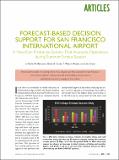Forecast-Based Decision Support for San Francisco International Airport: A NextGen Prototype System That Improves Operations during Summer Stratus Season
Author(s)
Reynolds, David W.; Clark, David A.; Wilson, Charles F.; Cook, Lara
DownloadReynolds-2012-FORECAST-BASED DECISION SUPPORT.pdf (2.086Mb)
PUBLISHER_POLICY
Publisher Policy
Article is made available in accordance with the publisher's policy and may be subject to US copyright law. Please refer to the publisher's site for terms of use.
Terms of use
Metadata
Show full item recordAbstract
During summer, marine stratus encroaches into the approach to San Francisco International Airport (SFO) bringing low ceilings. Low ceilings restrict landings and result in a high number of arrival delays, thus impacting the National Air Space (NAS). These delays are managed by implementation of ground delay programs (GDPs), which hold traffic on the ground at origination airports in anticipation of insufficient arrival capacity at SFO. In an effort to reduce delays and improve both airport and NAS efficiency, the Federal Aviation Administration (FAA) funded a research effort begun in 1995 to develop an objective decision support system to aid forecasters in the prediction of stratus clearing times. By improving forecasts at this major airport, the scope and duration of ground and airborne holds can be reduced. The Marine Stratus Forecast System (MSFS) issues forecasts both deterministically and probabilistically. Following transition to NWS operations in 2004, the system continued to provide reliable forecasts but showed no significant improvement in delay reduction. Changes to the FAA GDP issuance procedures in 2008 allowed them to utilize the improved forecasts, leading to quantifiable reductions in ground and airborne holds for SFO equating to dollars saved. To further reduce delays, a refined statistically based model, the Ground Delay Parameters Selection Model (GPSM) for selecting an optimal ground delay strategy has been developed, utilizing the available archive of objective MSFS probabilistic forecasts and accompanying traffic flow data. This effort represents one of the first systematic attempts to integrate objective probabilistic weather information into the air traffic flow decision process, which is a cornerstone element of the FAA's visionary NextGen program.
Date issued
2012-10Department
Lincoln LaboratoryJournal
Bulletin of the American Meteorological Society
Publisher
American Meteorological Society
Citation
Reynolds, David W., David A. Clark, F. Wesley Wilson, and Lara Cook. Forecast-Based Decision Support for San Francisco International Airport: A NextGen Prototype System That Improves Operations During Summer Stratus Season. Bulletin of the American Meteorological Society 93(10): 1503–1518, 2012. © 2012 American Meteorological Society
Version: Final published version
ISSN
0003-0007
1520-0477